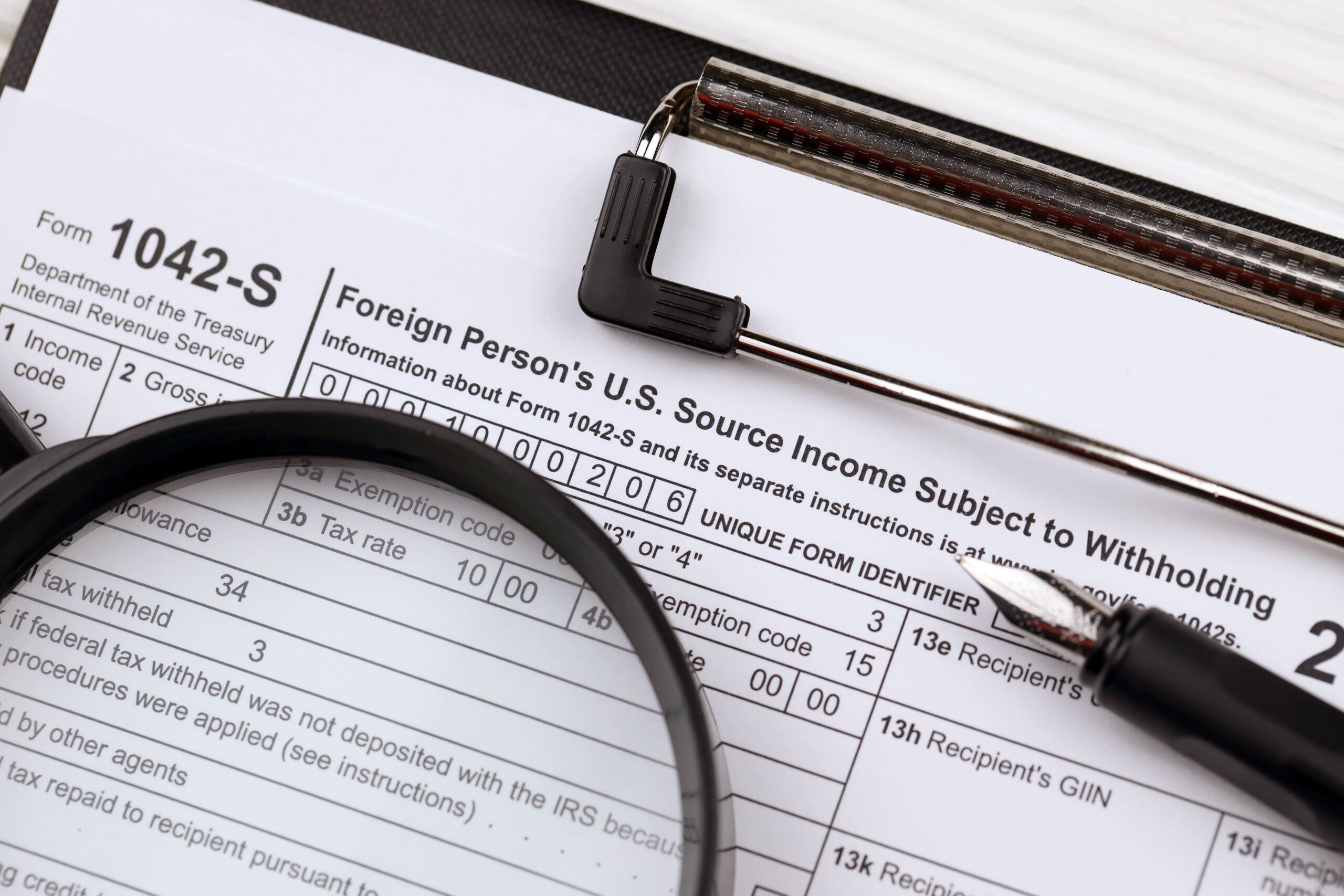Frequently asked questions about Form 1042 and the latest IRS guidance on e-filing.
In today’s global business environment, it is likely that your firm’s client base includes some who pay U.S.-sourced income to foreign individuals or entities. For many of these clients, navigating the tax-related complexities can prove challenging, especially in light of new Form 1042 filing requirements handed down by the IRS.
As a trusted advisor, clients turn to you for your guidance and expertise to help them ensure compliance. Therefore, it is important to have a clearer understanding of Form 1042 and what is required.
To help accounting professionals better serve clients, this article takes a closer look at who must file Form 1042, the connection with Forms 1042-S and 1042-T, changes on the horizon, and more.
Jump to ↓
| What is Form 1042 and who must file? |
| What information is needed to file Form 1042? |
| When is Form 1042 due? |
| What are the new changes to 1042 filing requirements? |
| Helping foreign clients in the U.S. with filing their returns |
What is Form 1042 and who must file?
Form 1042, Annual Withholding Tax Return for U.S. Source Income of Foreign Persons is the form used to report tax withheld on certain income of foreign persons.
As explained by the IRS, every domestic or foreign withholding agent (i.e., partnership, corporation, individual, association, etc.) or custodian/broker who receives, controls, has custody of, disposes of, or pays a withholdable payment or an amount subject to withholding, must file Form 1042 with the IRS. Form 1042 is only filed with the IRS; it is not sent to payees.
Withholdable payments can include, but are not limited to, scholarships and grants, compensation, dividends, interest, and royalties.
Two forms that are closely related to Form 1042, yet separate, are Form 1042-S and Form 1042-T. All three of these forms concern transactions involving foreign individuals, like nonresident aliens and foreign entities.
Form 1042-S and Form 1042-T
While Form 1042 is used to report tax withheld on certain income of foreign persons, Form 1042-S deals with payments made to foreign persons. For instance, if you have a business client who employs nonresident aliens that client must file Form 1042-S with the IRS for each nonresident client they employ. A copy of that form must also be sent to the nonresident alien employee. When filing paper Form 1042-S, it must always be filed jointly with Form 1042-T.
Form 1042-T is a straight-forward, one-page summary of Form 1042-S. This form is used to transmit paper Forms 1042-S to the IRS. As instructed by the IRS, a separate Form 1042-T must be used to transmit each type of Form 1042-S. If e-filing Form 1042-S, this transmittal sheet is not required.
What information is needed to file Form 1042?
When completing Form 1042, information that is required includes, but is not limited to, the following:
- The Employer identification number (EIN)
- The federal tax liability for payments made during the applicable quarter‐monthly period. Note that this section reports the tax liability, not the tax deposited by the withholding agent.
- The designation of tax liability as either a chapter 3 tax liability or a chapter 4 tax liability.
- The withholding agent’s chapter 3 and chapter 4 status codes, regardless of the types of payments being reported on Form 1042.
When is Form 1042 due?
Form 1042, as well as Forms 1042-S and 1042-T, must be filed with the IRS by March 15th of the year following the calendar year in which payment was made. If March 15th is a Saturday, Sunday, or legal holiday, then the due date moves to the next business day.
If more time is needed, a filing extension request can be submitted. To request an extension of time to file Form 1042, complete Form 7004, Application for Extension of Time to File Certain Excise, Income, Information, and Other Returns. It is important to be aware that Form 7004 does not extend the time for payment of the tax.
Also, keep in mind that Form 7004 is not the form used to request an extension of time to file Form 1042-S. For this extension request, complete Form 8809, Application for Extension of Time to File Information Returns.
What are the penalties for a late filing of Form 1042?
It is important to file Form 1042 and pay the taxes due on time as there are penalties and interest the IRS can levy.
As outlined by the IRS, the penalty for not filing Form 1042 on time (this includes extensions) is 5% of the unpaid tax for each month or part of a month the return is late, up to a maximum of 25% of the unpaid tax.
As for the late payment of tax, the penalty is typically one-half of 1% of the unpaid tax for each month or part of a month the tax is unpaid. The penalty cannot exceed 25% of the unpaid tax.
Even if an extension request is granted, interest will be charged on the taxes not paid by the due date.
The IRS noted that because figuring the amounts for penalties and interest can be complicated, it will send a bill for any amount due.

Blog
Understanding Form 1042-S, which records income paid to foreign individuals and entities
Read blog ↗What are the new changes to 1042 filing requirements?
Historically, the IRS did not provide the ability to e-file Form 1042. That has changed and, in fact, e-filing is set to become a requirement.
In February 2023, new regulations were issued requiring certain taxpayers to file Forms 1042 electronically through the IRS’ Modernized e-File (MeF) system beginning in 2024 (i.e., Tax Year 2023 Forms).
Under the new regulations, those withholding agents required to e-file Form 1042 are as follows:
- A withholding agent that is a partnership with more than 100 partners
- A withholding agent that is a financial institution
- A withholding agent that files at least 10 returns of any type (e.g., Form 1042-S) in the same calendar year in which Form 1042 must be filed.
However, in a more recent development, the IRS announced in February 2024 that it is delaying the Form 1042 e-filing requirement. The delay is in light of concerns among withholding agents and the challenges they said they face in transitioning to e-filing Form 1042.
In Notice 2024-26 the IRS announced that, “Withholding agents (both U.S. and foreign persons) are administratively exempt from the requirements to electronically file Forms 1042, Annual Withholding Tax Return for U.S. Source Income of Foreign Persons, required to be filed in calendar year 2024. Additionally, this notice announces that withholding agents that are foreign persons are administratively exempt from the requirements to electronically file Forms 1042 required to be filed in calendar year 2025. These administrative exemptions are intended to promote effective and efficient tax administration.”
Withholding agents are not required to request a waiver as the administrative exemption from the e-filing requirements is automatic.
Helping foreign clients in the U.S. with filing their returns
Navigating today’s global business environment can be complicated. However, with the right tools and resources in place, your firm can clarify the complex by delivering greater efficiencies to better serve foreign clients with U.S. income.
While the e-filing of Form 1042 is not yet required, Thomson Reuters provides the e-file capability in both GoSystem Tax RS and ONESOURCE, enabling practitioners to speed up the filing process for clients. Furthermore, users can import data from Excel directly into GoSystem Tax and ONESOURCE to help with Form 1042 data entry, saving firms time and improving efficiencies. Unlock the power to handle your most complex tax scenarios and have everything you need to e-file Form 1042.
If you are already a Thomson Reuters customer, visit our GoSystem Tax 1042 help page or ONESOURCE 1042 help page for more information on how to e-file.

Demo
See how GoSystem Tax RS provides the power to handle your most complex tax scenarios.
Watch demo ↗





